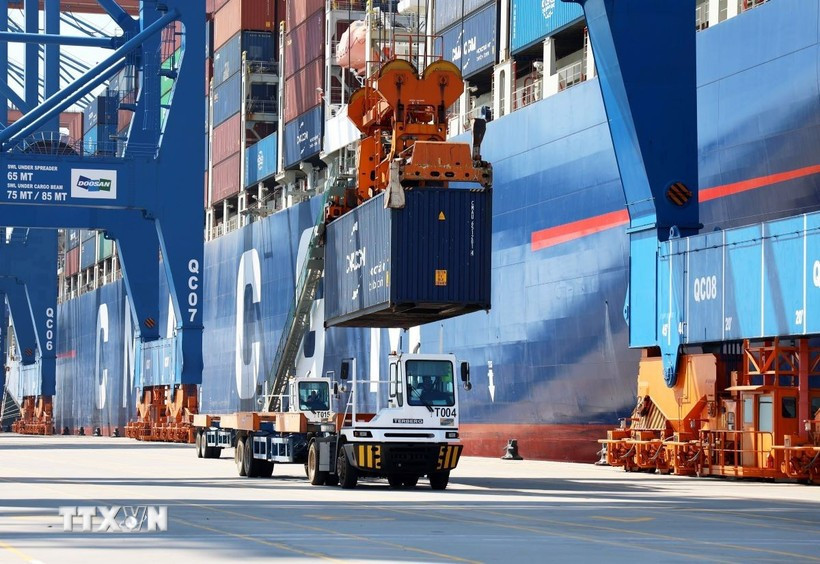Soaring German investments are testament to trust in Vietnam
Amid the prevailing winds of trade protectionism and escalating international sanctions, German investment in Vietnam is a testament to investors' trust in the potential of the Southeast Asian country.

The findings from the "Going International 2024" survey offer a beacon of enlightenment into the world of global business strategies, particularly illuminating the pathways of German investors both globally and within the vibrant landscape of Vietnam. Spanning from January 25 to February 11, 2024, this insightful inquiry engaged nearly 2,400 businesses headquartered in Germany and operating across international borders.
By the close of 2023, German investments in Vietnam had soared, culminating in 463 projects with an impressive total registered capital nearing $2.7 billion. This marked Germany's position as the 17th largest investing entity in Vietnam, a testament to the burgeoning partnership between the two nations. Notably, more than half of these ventures are concentrated in key hubs such as Ho Chi Minh City, Hanoi, Binh Duong, Dong Nai, and Hai Phong, with the remainder scattered across 33 other provinces and cities.
Among the approximately 500 German enterprises operating in Vietnam, over 100 have been actively engaged in manufacturing activities since 1993, underscoring the confidence of German businesses in the Vietnamese market and Vietnam's ascendancy as a premier destination for businesses seeking expansion within Asia.
Marko Walde, chief representative of the Delegation of the German Industry and Commerce in Vietnam, Myanmar, Cambodia, and Laos, said the European Union-Vietnam Free Trade Agreement (EVFTA) is acting as a catalyst for enhanced trade and investment between Vietnam and the EU, with Vietnam's steadfast dedication to these principles fostering a conducive business environment, thereby attracting heightened interest from German investors.
In the Asia-Pacific region (excluding China), German enterprises are also embracing a brighter outlook compared to their counterparts in other regions. A significant 65 per cent of businesses anticipate market stability, with an additional 15 per cent foreseeing positive advancements. Notably, this region stands out for its relatively less pessimistic business climate, and is poised to benefit from the strategic diversification of supply chains.
Illustrating this proactive approach, several German companies currently operating in China are expanding their supplier networks or establishing footholds in the Asia-Pacific region as part of the innovative "China +1 Strategy". However, amidst these promising prospects, challenges persist, particularly in bilateral German-China trade. The economic slowdown in China, coupled with escalating trade barriers such as localisation requirements, presents formidable obstacles.
The latest findings reveal a stark reality: a staggering 61 per cent of enterprises, the highest proportion recorded since 2012, grapple with escalating trade barriers, casting shadows over international operations.
Central to these challenges are the formidable hurdles of local certification requirements and heightened security protocols, exacerbating the intricacies and costs associated with cross-border trade. Moreover, the spectre of sanctions, particularly in dealings with Russia, looms ominously, alongside the opacity of legislation, elevated tariffs, and stringent local content regulations.
Compounding these external challenges are the burgeoning domestic impediments originating from within Germany itself, a disconcerting trend observed by 81 per cent of companies. Bureaucratic entanglements and regulatory uncertainties, epitomised by initiatives like the EU Carbon Border Adjustment Mechanism and the Supply Chain Due Diligence Act, ensnare enterprises in a web of complexity and ambiguity. Additionally, the protracted approval processes from the Federal Office for Economic Affairs and Export Control (BAFA) and convoluted customs clearance procedures further exacerbate the hurdles in international transactions.
Despite the modest growth of the global economy, German companies find themselves on the sidelines of prosperity, with bleak prospects for export growth in the current year. This prevailing sentiment reverberates globally, with 26 per cent of enterprises anticipating a deterioration in foreign business, juxtaposed against a meagre 13 per cent expecting improvement.
By Thanh Van
Source: VIR
Original link







